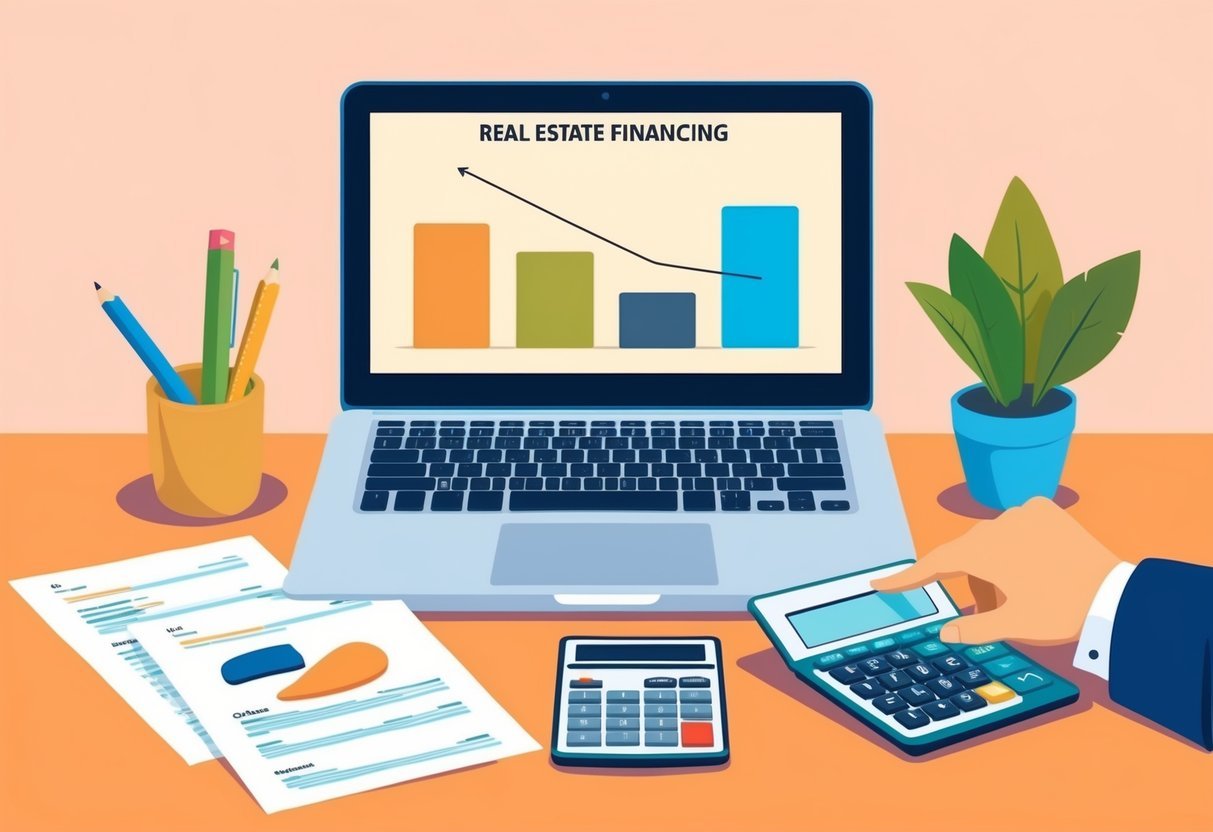Real estate financing can be a complex and challenging aspect of property investment.
Whether you’re a first-time homebuyer or an experienced investor, understanding the various funding options available is crucial for making informed decisions.
Exploring these resources can help you navigate the intricate world of real estate finance and find the best solutions for your specific needs.

By familiarizing yourself with different financing options, you can potentially save money, secure better terms, and maximize your investment returns. From traditional mortgages to creative financing strategies, there are numerous paths to fund your real estate ventures.
The following resources will provide you with valuable insights into the diverse landscape of real estate financing, empowering you to make smart choices in your property investment journey.
1) Understanding Mortgage Basics
When you venture into real estate financing, you need to grasp mortgage fundamentals.
A mortgage is a loan used to purchase property, typically paid back over 15-30 years.
Your mortgage payment consists of several components.
These include the principal, interest, taxes, and insurance.
The principal is the amount you borrowed, while interest is the cost of borrowing.
Your credit score plays a vital role in securing a mortgage. Maintaining a good credit score can increase your chances of approval and potentially lead to better interest rates.
The down payment is another key factor.
While 20% is often recommended, many lenders offer options with lower down payments.
Be aware that putting down less than 20% may require private mortgage insurance (PMI).
Your debt-to-income ratio is also important to lenders.
This compares your monthly debt payments to your income.
Keeping this ratio low can improve your mortgage eligibility.
Different types of mortgages are available, including conventional, FHA, and VA loans.
Each has its own requirements and benefits, so research to find the best fit for your situation.
Remember, getting pre-approved for a mortgage can give you a clearer picture of what you can afford and strengthen your position as a buyer.
2) FHA Loans Explained
FHA loans are a popular option for first-time homebuyers and those with limited financial resources.
These government-backed mortgages are insured by the Federal Housing Administration, allowing lenders to offer more flexible terms.
You’ll find that FHA loans typically have lower credit score requirements compared to conventional mortgages.
This makes homeownership more accessible if you’re working on improving your credit.
One of the key advantages of FHA loans is the low down payment requirement.
You can purchase a home with as little as 3.5% down if your credit score is 580 or higher.
This can significantly reduce the upfront costs of buying a property.
FHA loans also have competitive interest rates, which can help make your monthly payments more affordable.
Keep in mind that these loans come with both upfront and annual mortgage insurance premiums.
It’s important to note that FHA loans have lending limits that vary by county.
These limits are adjusted annually based on local housing costs, so be sure to check the current limits in your area.
When considering an FHA loan, remember that the property must meet certain standards set by the FHA.
This ensures that you’re investing in a safe and habitable home.
3) Veterans Affairs (VA) Loans

VA loans offer unique benefits for eligible veterans, active-duty service members, and some military spouses.
These VA-backed home loans provide favorable terms and often require no down payment.
To start the process, you’ll need to obtain a Certificate of Eligibility (COE).
This document proves your entitlement to the VA loan benefit.
You can request your COE online, through your lender, or by mail.
When you’re ready to buy, work with a real estate agent familiar with VA loans.
They can help you find properties that meet VA requirements and guide you through the home buying process.
VA loans typically offer competitive interest rates and don’t require private mortgage insurance.
This can result in significant savings over the life of your loan.
The VA also provides safeguards to help you avoid foreclosure if you encounter financial difficulties.
These protections can offer peace of mind as you embark on homeownership.
Remember to shop around for lenders.
While the VA guarantees the loans, private lenders provide the financing.
Compare offers to find the best terms for your situation.
During the closing process, be prepared for a VA appraisal.
This ensures the property meets VA standards and is worth the purchase price.
4) Conventional Loan Insights

Conventional loans are a popular choice for many homebuyers.
These loans are not backed by government agencies and offer flexibility in terms and conditions.
You’ll find that conventional loans come in various types, catering to different financial situations and property values.
One key advantage is the potential for lower down payments.
Contrary to common belief, you don’t always need to put 20% down.
Many conventional loan programs now offer options with as little as 3% down, making homeownership more accessible.
For those looking to purchase in high-cost areas, Conventional High Balance loans can be a valuable resource.
These loans allow you to finance properties with values exceeding standard loan limits, up to $1,203,975 in some cases.
When considering a conventional loan, it’s crucial to assess your financial situation carefully.
Check your credit score and calculate your debt-to-income ratio.
These factors will significantly influence your loan terms and interest rates.
Keep in mind that conventional loans often require private mortgage insurance (PMI) if your down payment is less than 20%.
However, you can typically cancel PMI once you’ve built up 20% equity in your home.
To navigate the conventional loan landscape effectively, consider working with a mortgage professional.
They can help you understand the nuances of different loan programs and find the best fit for your unique situation.
5) Adjustable Rate Mortgages (ARMs)

Adjustable Rate Mortgages offer a unique financing option for homebuyers.
Unlike fixed-rate mortgages, ARMs have interest rates that can change over time based on market conditions.
ARMs typically start with a lower interest rate compared to fixed-rate mortgages.
This initial rate remains stable for a set period, which can range from 3 to 10 years.
After the introductory period, your interest rate will adjust periodically.
These adjustments usually occur every six months or annually, depending on the specific terms of your loan.
The potential for lower initial payments makes ARMs attractive to some buyers.
You might benefit from an ARM if you plan to sell or refinance within a few years.
However, it’s crucial to understand the risks.
Your monthly payments could increase significantly if interest rates rise.
Make sure you’re comfortable with this possibility before choosing an ARM.
ARMs come in various forms, such as 5/1, 7/1, or 10/1.
The first number indicates the fixed-rate period, while the second shows how often the rate adjusts afterward.
When considering an ARM, pay close attention to the adjustment caps.
These limits restrict how much your rate can increase in a single adjustment or over the life of the loan.
6) Jumbo Loans Details

Jumbo loans are mortgages that exceed the conforming loan limits set by the Federal Housing Finance Agency.
In 2024, the maximum amount for a conforming loan is $766,550 in most areas of the United States.
These loans are designed for financing high-value properties that surpass conventional mortgage limits.
You’ll find them useful when purchasing luxury homes or properties in expensive real estate markets.
To qualify for a jumbo loan, you’ll typically need a higher credit score, often 700 or above.
Lenders also require a larger down payment, usually 10-20% of the home’s value.
Your debt-to-income ratio plays a crucial role in jumbo loan approval.
Aim for a DTI of 43% or less, with 35% being ideal.
This demonstrates your ability to manage the larger loan payments.
Be prepared to provide extensive financial documentation when applying for a jumbo loan.
Lenders scrutinize your assets, income, and overall financial health more closely than with conventional mortgages.
Interest rates for jumbo loans can be higher than those for conforming loans.
However, this isn’t always the case, so it’s worth shopping around to find competitive rates.
Remember that jumbo loan requirements can vary by lender.
Some may categorize loans differently based on location, especially in high-cost areas where conforming limits can reach up to $1,149,825.
Understanding Mortgage Loans

Mortgage loans are a crucial aspect of real estate financing.
They provide a pathway to homeownership and come in various forms to suit different financial situations.
Types of Mortgage Loans
Different types of home loans are available to meet diverse needs.
Conventional loans are common and typically require a 20% down payment.
FHA loans, backed by the Federal Housing Administration, offer lower down payments and are ideal for first-time buyers.
VA loans cater to veterans and active-duty military personnel.
Fixed-rate mortgages maintain the same interest rate throughout the loan term, providing stability.
Adjustable-rate mortgages (ARMs) start with lower rates that can change over time.
Jumbo loans are designed for high-value properties exceeding conforming loan limits.
Each loan type has specific requirements and benefits, so it’s essential to research thoroughly.
Factors Affecting Mortgage Rates
Your credit score plays a significant role in determining your mortgage rate.
A higher score often leads to more favorable terms.
The loan-to-value ratio can also impact rates.
This ratio compares the loan amount to the property’s value, and a lower ratio typically results in better rates.
Economic conditions and market trends also influence mortgage rates.
Federal Reserve policies and inflation rates can cause fluctuations.
The loan term affects rates as well.
Generally, shorter-term loans have lower rates but higher monthly payments.
Your down payment amount and debt-to-income ratio are other crucial factors lenders consider when setting rates.
Alternative Financing Options

Real estate investors can explore creative ways to fund property purchases beyond traditional mortgages.
These options provide flexibility and may suit unique financial situations.
Owner Financing
Owner financing allows you to buy property directly from the seller without involving a bank.
The seller acts as the lender, and you make payments to them instead of a financial institution.
This approach can be beneficial if you have difficulty qualifying for a conventional mortgage.
Benefits of owner financing include:
- Potentially lower down payments
- Flexible terms negotiated directly with the seller
- Faster closing process
You’ll need to agree on terms like interest rate, repayment period, and balloon payment (if any) with the seller.
Be sure to have a lawyer review the agreement to protect your interests.
Lease-Option Agreements
A lease-option agreement gives you the right to purchase a property after renting it for a specified period.
This arrangement can be advantageous if you need time to improve your credit score or save for a down payment.
Key aspects of lease-option agreements include:
- Option fee: A non-refundable payment for the right to purchase
- Rent credits: A portion of your rent may go towards the purchase price
- Purchase price: Agreed upon in advance or determined by market value at the time of purchase
You’ll want to carefully review the terms of the agreement, including the option period length and any conditions for exercising your option to buy.
Frequently Asked Questions

Real estate financing options can be complex and varied.
Investors need to understand the different types of loans, creative financing techniques, and key factors that influence financing decisions.
What are the various types of real estate financing available to investors?
Real estate investors have several financing options at their disposal.
These include conventional mortgages, FHA loans, VA loans, and adjustable-rate mortgages (ARMs).
Each type has unique features and requirements.
Conventional loans typically require a higher credit score and down payment.
Meanwhile, FHA loans offer more flexible qualification criteria, making them attractive for first-time buyers.
What are unconventional real estate financing methods?
Unconventional financing methods can provide alternatives when traditional loans aren’t suitable.
These may include hard money loans, private money lenders, and seller financing.
Bridge loans are another option, allowing you to purchase a new property before selling an existing one.
These short-term loans can be particularly useful in competitive markets.
How does one determine the best financing option for real estate investments?
Choosing the right financing option depends on various factors.
Consider your investment goals, financial situation, and the specific property you’re interested in.
You should also evaluate the interest rates, loan terms, and repayment schedules of different options.
Additionally, don’t forget to assess your risk tolerance and long-term investment strategy.
What are some creative financing techniques used in real estate transactions?
Creative financing techniques can help you acquire properties with non-traditional methods.
These may include lease options, subject-to deals, and owner financing.
Crowdfunding has also emerged as an innovative way to finance real estate investments.
This method allows you to pool resources with other investors to fund larger projects.
Can you explain the key factors that influence real estate financing decisions?
Several factors impact financing decisions in real estate.
Your credit score plays a significant role in determining loan eligibility and interest rates.
Meanwhile, the property’s value, location, and intended use also affect financing options.
Lenders may have different requirements for residential, commercial, or investment properties.
What are the considerations for choosing between short-term and long-term real estate financing?
When deciding between short-term and long-term financing, you should consider your investment strategy.
Short-term loans like bridge loans or hard money can be useful for quick property flips.
Long-term financing, such as conventional mortgages, may be more suitable for buy-and-hold investments.
Make sure to evaluate the interest rates, fees, and flexibility of each option to make an informed decision.

